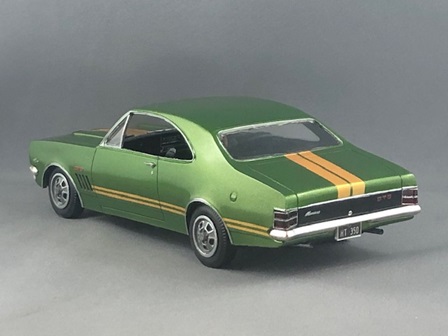Modelling in scrapmetal Pt1
2 posters
Page 1 of 1
 Modelling in scrapmetal Pt1
Modelling in scrapmetal Pt1
I was talking to a couple of blokes in the local hobby store this arvo about model building. One of them was really into motorcycles but they were both only into plastic kits. I mentioned about my scratch built models and I got the very strong impression that they pictured them as abstract sculpture sort of thing. On my way home I started thinking that seeing as I got such a positive response from you guys about my models, some one out there might just be interested in how I build them. So for those that are interested and those who are really bored and will read just about anything, here is my take on model building with scrap metal.
The subject for this story is a model I have recently built for a bloke in QLD. He saw some piccies in a Vintage Bike magazine and contacted me and asked me to build a model of a bike he used to own.
[img] [/img]
[/img]
This is a photo of a 1941 BSA M20. This photo was found on a vintage motorcycle web site which became my main reference source. This photo, along with several others showed me every angle and detail for the build. I also sent a photo to the bloke in QLD and he returned it with several jottings on it explaining modifications and colour scheme for his particular bike. These details have allowed me to personalise it for him. Next, I drafted a full size plan for me to work off (you'll see this in a photo later on). On it I drew the wheels in full size and then mapped out the frame and front end.
The front end. As you can see in the above photo, these old bikes had a very complicated fork system often called a "girder" front end. I made mine using 4mm steel rod, small pieces of flat bar and a small compression spring from a GJ kit for the main suspension spring all mig welded together. The real thing has a friction knob on each side at the main pivot point and the best I could do was use the heads off a couple of phillips head screws to replicate. By the way, the wheels are 110mm diam and I buy them from a mob who supply plastic wheels primarily for wooden toys. Axle is just a flat head nail.
[img] [/img]
[/img]
[img] [/img]
[/img]
[img] [/img]
[/img]
The frame is next. Working off the plan, lengths of 6mm steel rod are heated and bent and then migged together. The head stock is made of 8mm rod cut to length (about 20mm) and then a suitable size hole is drilled down its guts. The head stem is again a flat head nail. Also note that this old bike used a centre stand pivotting off the rear axle. Most of my bikes use a side stand which I make from 4mm rod with each end heated and flattened and then using a small screw into a nut which is welded to the lower frame rail).
[img] [/img]
[/img]
[img] [/img]
[/img]
So now we have the rolling chassis. Next is the engine. This is the part where many people have told me that they can't believe how it starts out. In this case being a single cylinder, take one m20 nut for the crankcase, add one m10 bolt, mix in several various sized washers, finish it off with a short length of 25x25 RHS, weld lightly and voila, an engine is born.
[img] [/img]
[/img]
A couple of small bolts running through a couple of pieces of flat welded to the lower frame rails and tightened into two nuts welded to the bottom of the engine cases and we get an idea of how it'll look and if it needs to be modified at all.
[img] [/img]
[/img]
Looks like crap doesn't it? But this is where the fun starts. Detailing the engine involves a lot of cutting, heating, bending, welding, grinding and sanding. In this case theres the gearbox cover on the right side with its kick starter, clutch lever and gear lever. The kickstarter and gear lever are made of faily large nails bent to shape and then with a short piece of small bolt thread welded on. When painted matt black, these look just like rubber. Plus theres the magneto drive cover from the end of the crank to the rear of the cylinder.
[img] [/img]
[/img]
On the left side theres the primary drive cover. All of this is made from 1mm sheet metal and very low mig settings. The forward bulge is a socket head screw and the larger rear bulge is the head off a dome head bolt.
[img] [/img]
[/img]
Next a few more details such as the exhaust header made from 6mm rod heated and bent. Also the carby with its off set fuel bowl and the magneto all of which is made from various rod and bolts.
[img] [/img]
[/img]
[img] [/img]
[/img]
Well thats enough for part one in this saga. Tune in again next time for more madness as I try to make a muffler which looks like a fish, rounded mudguards from a single piece of flat tin and a headlight which I stole from the bathroom.
Happy modelling
The subject for this story is a model I have recently built for a bloke in QLD. He saw some piccies in a Vintage Bike magazine and contacted me and asked me to build a model of a bike he used to own.
[img]
 [/img]
[/img]This is a photo of a 1941 BSA M20. This photo was found on a vintage motorcycle web site which became my main reference source. This photo, along with several others showed me every angle and detail for the build. I also sent a photo to the bloke in QLD and he returned it with several jottings on it explaining modifications and colour scheme for his particular bike. These details have allowed me to personalise it for him. Next, I drafted a full size plan for me to work off (you'll see this in a photo later on). On it I drew the wheels in full size and then mapped out the frame and front end.
The front end. As you can see in the above photo, these old bikes had a very complicated fork system often called a "girder" front end. I made mine using 4mm steel rod, small pieces of flat bar and a small compression spring from a GJ kit for the main suspension spring all mig welded together. The real thing has a friction knob on each side at the main pivot point and the best I could do was use the heads off a couple of phillips head screws to replicate. By the way, the wheels are 110mm diam and I buy them from a mob who supply plastic wheels primarily for wooden toys. Axle is just a flat head nail.
[img]
 [/img]
[/img][img]
 [/img]
[/img][img]
 [/img]
[/img]The frame is next. Working off the plan, lengths of 6mm steel rod are heated and bent and then migged together. The head stock is made of 8mm rod cut to length (about 20mm) and then a suitable size hole is drilled down its guts. The head stem is again a flat head nail. Also note that this old bike used a centre stand pivotting off the rear axle. Most of my bikes use a side stand which I make from 4mm rod with each end heated and flattened and then using a small screw into a nut which is welded to the lower frame rail).
[img]
 [/img]
[/img][img]
 [/img]
[/img]So now we have the rolling chassis. Next is the engine. This is the part where many people have told me that they can't believe how it starts out. In this case being a single cylinder, take one m20 nut for the crankcase, add one m10 bolt, mix in several various sized washers, finish it off with a short length of 25x25 RHS, weld lightly and voila, an engine is born.
[img]
 [/img]
[/img]A couple of small bolts running through a couple of pieces of flat welded to the lower frame rails and tightened into two nuts welded to the bottom of the engine cases and we get an idea of how it'll look and if it needs to be modified at all.
[img]
 [/img]
[/img]Looks like crap doesn't it? But this is where the fun starts. Detailing the engine involves a lot of cutting, heating, bending, welding, grinding and sanding. In this case theres the gearbox cover on the right side with its kick starter, clutch lever and gear lever. The kickstarter and gear lever are made of faily large nails bent to shape and then with a short piece of small bolt thread welded on. When painted matt black, these look just like rubber. Plus theres the magneto drive cover from the end of the crank to the rear of the cylinder.
[img]
 [/img]
[/img]On the left side theres the primary drive cover. All of this is made from 1mm sheet metal and very low mig settings. The forward bulge is a socket head screw and the larger rear bulge is the head off a dome head bolt.
[img]
 [/img]
[/img]Next a few more details such as the exhaust header made from 6mm rod heated and bent. Also the carby with its off set fuel bowl and the magneto all of which is made from various rod and bolts.
[img]
 [/img]
[/img][img]
 [/img]
[/img]Well thats enough for part one in this saga. Tune in again next time for more madness as I try to make a muffler which looks like a fish, rounded mudguards from a single piece of flat tin and a headlight which I stole from the bathroom.
Happy modelling

Pete- I should be working on Models

-
 Number of posts : 118
Number of posts : 118
Age : 64
Location : Dubbo NSW
Registration date : 2008-03-31
 Re: Modelling in scrapmetal Pt1
Re: Modelling in scrapmetal Pt1
That is incredible!
Can't wait for Part 2
Can't wait for Part 2

Carps- AMCC ADDICT

-
 Number of posts : 3168
Number of posts : 3168
Age : 34
Location : Could be anywhere.
Registration date : 2008-03-21
 Similar topics
Similar topics» Scrapmetal Board Track Racer
» Scrapmetal Board Track Racer Finished
» NAM NNL Modelling Competition
» Modelling in scrap metal Pt2
» Modelling in scrap metal Pt 3 - Final
» Scrapmetal Board Track Racer Finished
» NAM NNL Modelling Competition
» Modelling in scrap metal Pt2
» Modelling in scrap metal Pt 3 - Final
Page 1 of 1
Permissions in this forum:
You cannot reply to topics in this forum